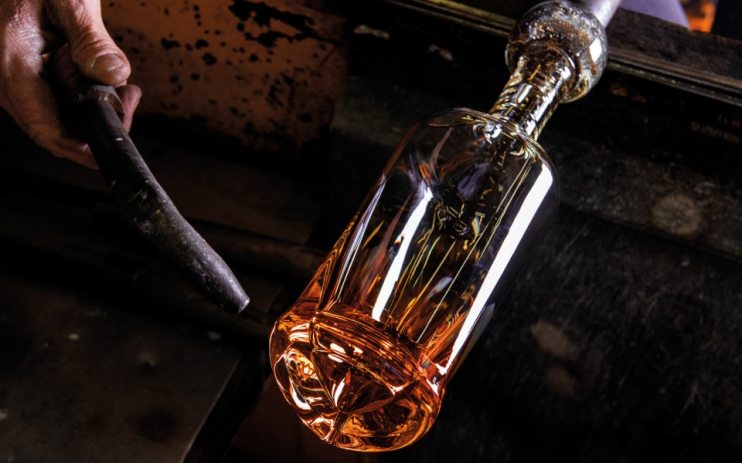The whisky-maker putting the ‘fun’ in Non-Fungible

Glenfiddich is putting the “fun” into non-fungible, with NFTs you can drink. The pioneering single malt whisky brand is partnering with BlockBar, a new platform for buying, collecting and trading non-fungible tokens (NFTs) related to luxury wines and spirits. The service will launch next week, with the sale of limited edition Glenfiddich NFTs: fifteen unique digital images featuring bottles of 46-year-old single malt whisky finished for more than two decades in an Armagnac cask, with their real-world counterparts included in the purchase price.
It’s only four years since Glenfiddich offered consumers the Lawnmower Man experience of “Glenfiddich Virtual Infinity”, a surreal VR headset tour of one of their Dufftown Warehouses, in which users could magically enter a solera vat and do mid-air calligraphy with a poorly animated paint-roller. So, when the whisky distiller announces it is about to do something with NFTs, you could be forgiven for thinking it is opportunistically jumping on another passing technological fad… but you may well be mistaken.
The general public probably only became aware of NFTs in the last couple of months, when the news was briefly awash with stories of people selling clip art for the sorts of money that might otherwise change hands for houses. The story was that these NFT artworks – unique items, the “authenticity” and “ownership” of which could be tracked through blockchain – were opening a new frontier in the market for art.
What’s happening here is different, because it creates a market offering more than the opportunity to buy and sell digital tokens. BlockBar’s NFTs represent physical assets, for which they can be exchanged. What this means is that if you purchase an NFT of a bottle on the platform, you also become the owner of the real-world product it represents. In these circumstances your NFT is not really a piece of digital art, it is effectively a receipt that verifies your ownership of the corresponding bottle, and its authenticity, with transactions recorded in the Ethereum blockchain. As the owner, you have the option to resell or transfer the NFT through the BlockBar platform, or you can “burn” it in order to redeem its physical counterpart.
BlockBar makes collecting and trading luxury spirits easier, by holding the bottles that correspond to their NFTs in a bonded warehouse in Singapore. Trades can take place virtually, with physical transfers and duties only becoming necessary when a token is redeemed. This clear chain of physical custody – from producer, to BlockBar, to the owner who redeems the corresponding NFT – is a further guarantee of the authenticity of the physical product in a market where uncertain provenance and outright fraud are acknowledged problems.
Recent media coverage of NFT art sales has focused on the ridiculousness of spending over half a million dollars on an 8-bit representation of Nyan Cat, and there is certainly a “doing it for the lulz” aspect to much of this activity, but there are also many treating such purchases as a serious investment. In a Twitter thread one NFT speculator – who had paid $46,300 for a greyscale digital portrait of a pet rock – rationalised the purchase, saying, “As we get into an age of digital collectibles, being one of the earliest forms of the art and the first do something gives them provenance that is valuable. There is also a nostalgia aspect, collectors will seek early pieces with historical significance.” The BlockBar platform provides a channel through which this manic energy can enter the already buoyant market for luxury spirits.
BlockBar also creates new opportunities for producers, who will now be able to benefit from appreciation and sales in the secondary market, by taking a percentage on trades of their products through the platform.
They will also be able to track the ownership of their bottles, which could become a useful tool for marketing to serious investors and collectors. Doug Bagley, chief operating officer of Glenfiddich’s parent company William Grant & Sons, sees clear advantages to the system, stating, “We are proud to be the first luxury spirits brand to be available on BlockBar at the time of the launch. BlockBar brings a heightened level of authenticity to our brand via its proprietary NFT platform and creates an elite club of distinguished collectors with whom we’re excited to build long-term relationships.”
BlockBar’s first series of drinks-backed NFTs will launch on 19 October, and will be available on a first-come, first-served basis. The tokens represent fifteen 700ml bespoke Baccarat crystal decanters, filled with a 1973 Glenfiddich 46-year-old Armagnac cask finish single malt whisky, bottled at 43.9% ABV.
Buyers can purchase the NFTs from Blockbar with the Ethereum crypto-currency (ETH) or a credit card, for an expected price of around 5.2 ETH or $18,000 (£13,200).